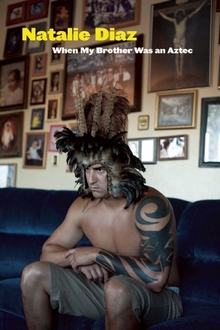Review: When My Brother Was an Aztec by Natalie Diaz
“A lot of the images that I’ve grown up with, that’s kind of how I filter the world, through those images, and images carry meaning for me. A lot of the words I use – that’s the way we talk here [Fort Mohave Indian Reservation], that’s the way I’ve learned to express myself or at lest to try to express myself.”
Hearing these words from Natalie Diaz, author of When My Brother Was an Aztec, in an interview on public radio, immediately caught my attention.
Diaz discussed work she is doing on her Native American reservation to preserve the Mojave language that is threatened by extinction in the overarching present. The subject of language preservation as well as a discussion of When My Brother Was an Aztec, held my rapt attention.
Diaz pointed out when asked about her sense of identity as a Mohave, that her father is Spanish, that she is also Pima and Mohave, and she grew up outside of the Phoenix area.
We had a little bit of everything in our house.
Diaz discussed her passion for writing as a “sense of hunger” within her, her love of basketball, of how basketball became a way to quiet her life – at least somewhat, and the pain of her brother’s meth addiction and how it affected her family altering or nearly wrecking its structure.
Her intelligence and passion for her writing and diverse culture led me to purchase her 2012 book of poems and vignettes, When My Brother Was an Aztec. This slim 100 page volume holds beauty, sorrow and celebration. It’s not a quick nor an easy read, but it is well worth a commitment to reading it.
I could not read this small book of poetry for a sustained period of time. The intensity of each piece does not invite a quick turning of the pages.
Rather, When My Brother Was an Aztec insists on quiet contemplation.
The first selection, a poem bearing the book’s title, left me asking why Diaz focused on the image of an Aztec.
They fed him
crushed diamonds, and fire. He gobbled the gifts. My parents
begged him to pluck their eyes out. He thought he was
Huizilopochtli, a god, half-man half-hummingbird. My parents
at his feet, wrecked honeysuckles, he lowered his swordlike mouth,
gorged on them, draining color until their eyebrows whitened.
My brother shattered and quartered them before basement festivals -
waved their shaking hands in his fists,
Research into Aztec religion gave me insight into this metaphor. Sacrifice, human sacrifice, held prominence. Priests sacrificed humans to keep the sun god happy, Wars were fought to obtain human sacrifice and slaves too were offered up on God’s Feast Day. These offerings helped insure that food would grow and the culture would therefore flourish. In Aztec faith, it was about the way one died more than how one lived that determined if eternity would be spent with the sun god or enveloped in a dark and gloomy underworld.
Ah! Now the book’s title resonated with the power of myth to conjure images of sacrifice and loving commitment to the one doing the sacrificing. Diaz’s brother fed on the love and the meth that entangled him, yet the sacrifice of his family brought forth sorrow, although the family steadfastly loved him.
When My Brother Was an Aztec offers sophisticated imagery and allusion pulsing with beautiful language blending together into a reading experience like none other. In a poem titled I Lean Out the Window and She Nods Off in Bed, the Needle Gently Rocking on the Bedside Table, lovely language collides with amazing allusion.
While she sleeps, I paint
Valencia oranges across her skin,
seven times the color orange
a bright tree glittering the limestone grotto of her clavicle -
Later an allusion to Lorca’s gypsy nun flows into the image of a woman sleeping in
the throes of a drug-induced peace.
She sleeps, gone to the needle’s gentle rocking,
and I lean out the window, a Horus
drunk on my own scent
and midnight’s slow drip of stars.
This little but powerful collection of Diaz’s work is a treasure.
The topics, although often dark, shine with beauty, sophistication and sensitivity to the complexities of human experience. Certainly, reservation life offers challenges rising out of poverty and a culture that fights to maintain its integrity in modern society. The aspects of poverty without hope clearly present itself in the many references to drug use. The beauty of a Diaz’s words highlight the beauty of Mojave culture interspersed with the diversity found in her own household.
When My Brother Was an Aztec has an urgency, a hunger for preserving and offering thoughtful insights and respect for all the insights Diaz offers in her work: sophisticated and beautiful language, imagery and ideas that stayed with me long after the pages were closed and a love for her brother, family and tribe.
Complex and fascinating, thoughtful yet forthright, disturbing and uplifting, Diaz’s book’s not for those who cannot or do not want to enter through language another way of seeing and doing.
Its beauty lies not in differences but in the commonality of humanity and love.
{Buy When My Brother Was an Aztec at Amazon | BN | Book Depository}
{Add it on Goodreads}

Review: Collateral by Ellen Hopkins






